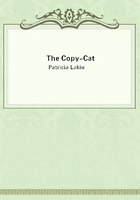
第34章 LITTLE LUCY ROSE(2)
Dear little Lucy hesitated. She did not wish to hurt the feelings of boys, and the question had been loudly put. Finally she said she didn't know. Lack of definite knowledge was little Lucy's rock of refuge in time of need. She would look adorable, and say in her timid little fluty voice, "I don't -- know."The last word came always with a sort of gasp which was alluring. All the listening boys were convinced that little Lucy loved them all individually and gen-erally, because of her "I don't -- know."Everybody was convinced of little Lucy's affec-tion for everybody, which was one reason for her charm. She flattered without knowing that she did so. It was impossible for her to look at any living thing except with soft eyes of love. It was impos-sible for her to speak without every tone conveying the sweetest deference and admiration. The whole atmosphere of Madame's school changed with the advent of the little girl. Everybody tried to live up to little Lucy's supposed ideal, but in reality she had no ideal. Lucy was the simplest of little girls, only intent upon being good, doing as she was told, and winning her father's approval, also her cousin Martha's.
Martha Rose was quite elderly, although still good-looking. She was not popular, because she was very silent. She dressed becomingly, received calls and returned them, but hardly spoke a word.
People rather dreaded her coming. Miss Martha Rose would sit composedly in a proffered chair, her gloved hands crossed over her nice, gold-bound card-case, her chin tilted at an angle which never varied, her mouth in a set smile which never wavered, her slender feet in their best shoes toeing out precisely under the smooth sweep of her gray silk skirt. Miss Martha Rose dressed always in gray, a fashion which the village people grudgingly admired. It was undoubtedly becoming and distinguished, but savored ever so slightly of ostentation, as did her custom of always dressing little Lucy in blue. There were different shades and fabrics, but blue it always was. It was the best color for the child, as it re-vealed the fact that her big, dark eyes were blue.
Shaded as they were by heavy, curly lashes, they would have been called black or brown, but the blue in them leaped to vision above the blue of blue frocks. Little Lucy had the finest, most delicate features, a mist of soft, dark hair, which curled slightly, as mist curls, over sweet, round temples.
She was a small, daintily clad child, and she spoke and moved daintily and softly; and when her blue eyes were fixed upon anybody's face, that person straightway saw love and obedience and trust in them, and love met love half-way. Even Miss Martha Rose looked another woman when little Lucy's innocent blue eyes were fixed upon her rather handsome but colorless face between the folds of her silvery hair; Miss Martha's hair had turned prematurely gray. Light would come into Martha Rose's face, light and animation, although she never talked much even to Lucy. She never talked much to her cousin Cyril, but he was rather glad of it.
He had a keen mind, but it was easily diverted, and he was engrossed in his business, and concerned lest he be disturbed by such things as feminine chatter, of which he certainly had none in his own home, if he kept aloof from Jenny, the colored maid. Hers was the only female voice ever heard to the point of annoyance in the Rose house.
It was rather wonderful how a child like little Lucy and Miss Martha lived with so little conversa-tion. Martha talked no more at home than abroad;moreover, at home she had not the attitude of wait-ing for some one to talk to her, which people outside considered trying. Martha did not expect her cousin to talk to her. She seldom asked a question. She almost never volunteered a perfectly useless obser-vation. She made no remarks upon self-evident topics. If the sun shone, she never mentioned it.
If there was a heavy rain, she never mentioned that.
Miss Martha suited her cousin exactly, and for that reason, aside from the fact that he had been devoted to little Lucy's mother, it never occurred to him to marry again. Little Lucy talked no more than Miss Martha, and nobody dreamed that she sometimes wanted somebody to talk to her. Nobody dreamed that the dear little girl, studying her lessons, learn-ing needlework, trying very futilely to play the piano, was lonely; but she was without knowing it herself. Martha was so kind and so still; and her father was so kind and so still, engrossed in his papers or books, often sitting by himself in his own study.
Little Lucy in this peace and stillness was not hav-ing her share of childhood. When other little girls came to play with her. Miss Martha enjoined quiet, and even Lily Jennings's bird-like chattering be-came subdued. It was only at school that Lucy got her chance for the irresponsible delight which was the simple right of her childhood, and there her zeal for her lessons prevented. She was happy at school, however, for there she lived in an atmos-phere of demonstrative affection. The teachers were given to seizing her in fond arms and caress-ing her, and so were her girl companions; while the boys, especially Jim Patterson, looked wistful-ly on.
Jim Patterson was in love, a charming little poetical boy-love; but it was love. Everything which he did in those days was with the thought of little Lucy for incentive. He stood better in school than he had ever done before, but it was all for the sake of little Lucy. Jim Patterson had one talent, rather rudimentary, still a talent. He could play by ear.